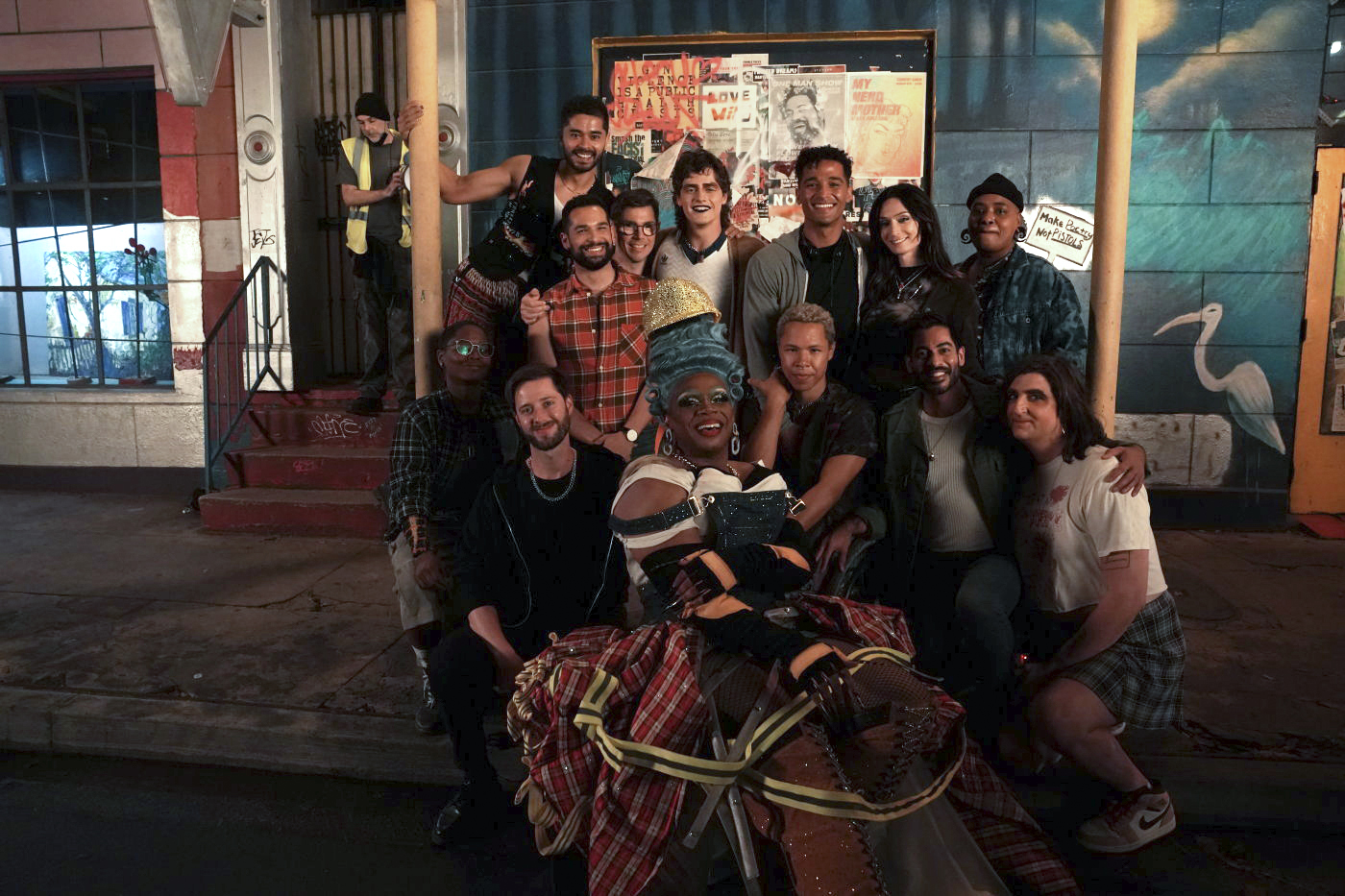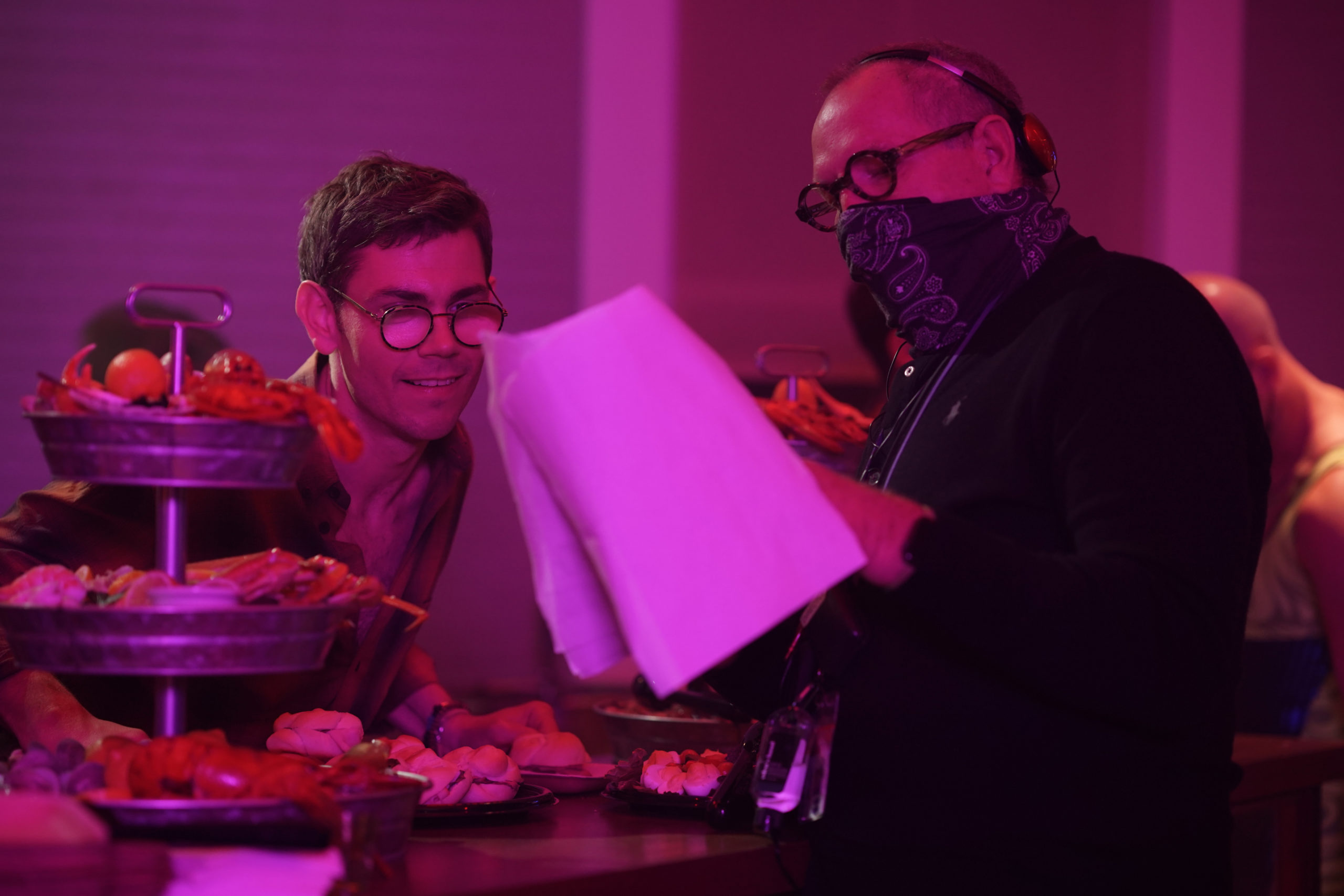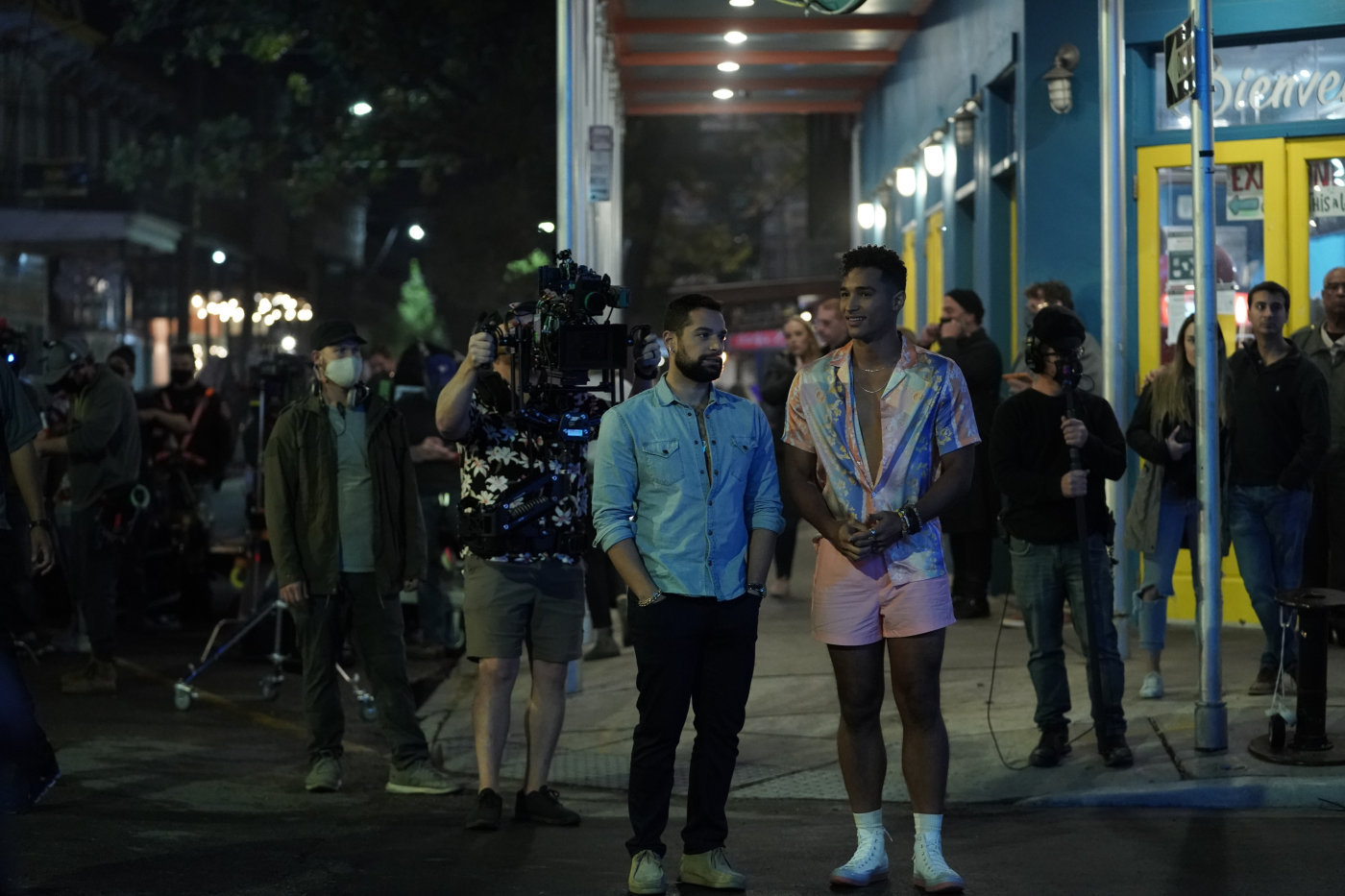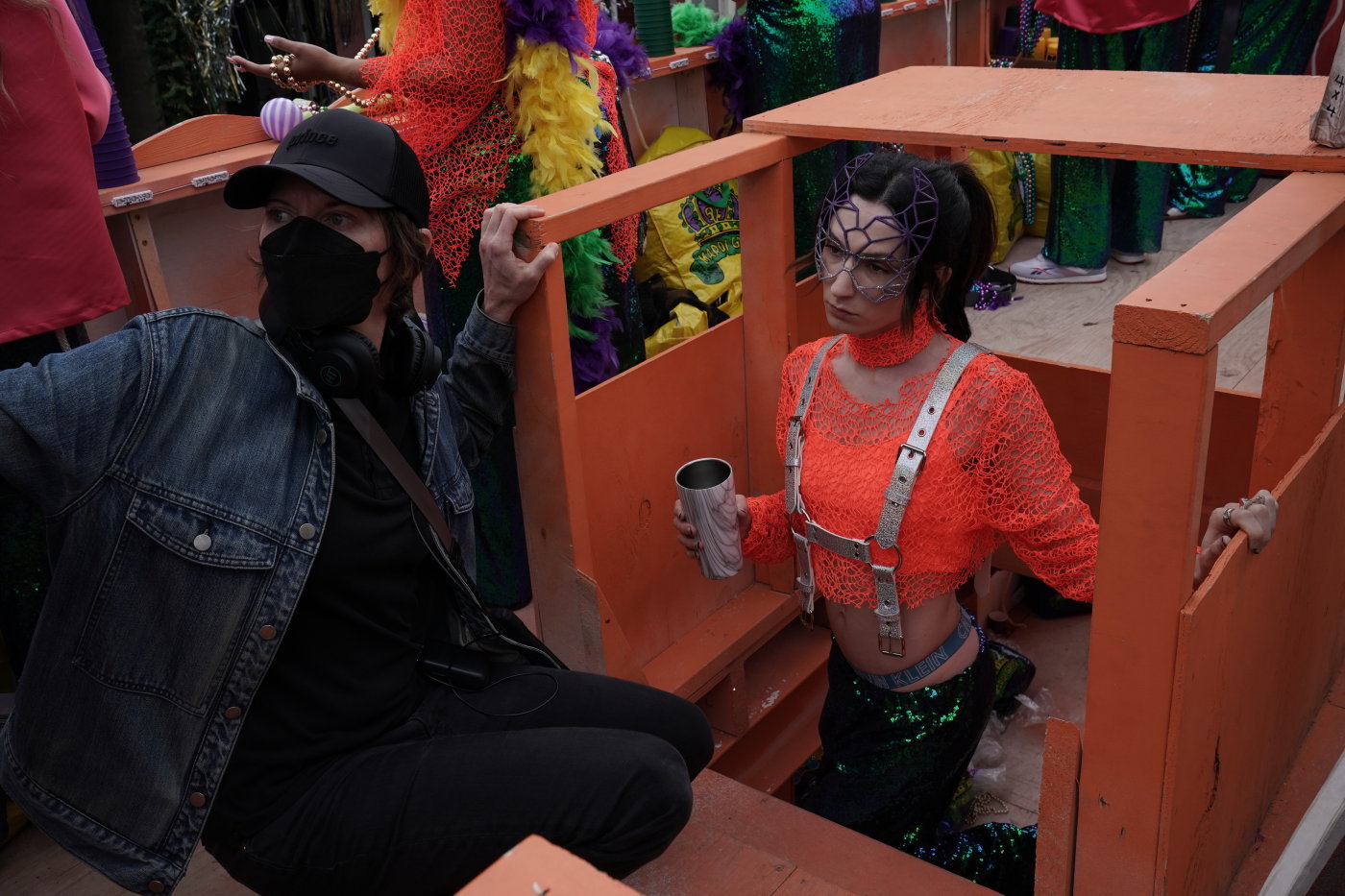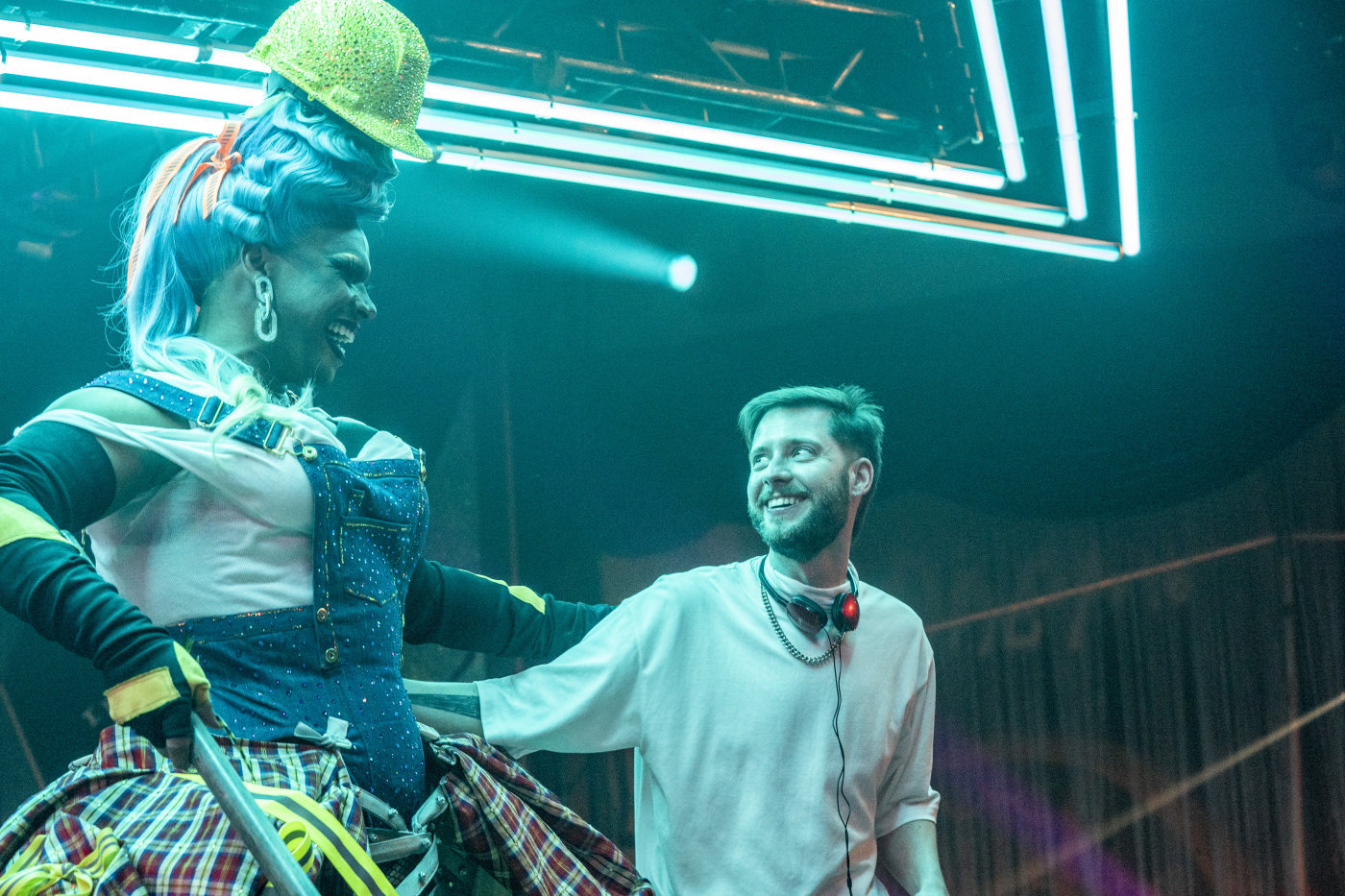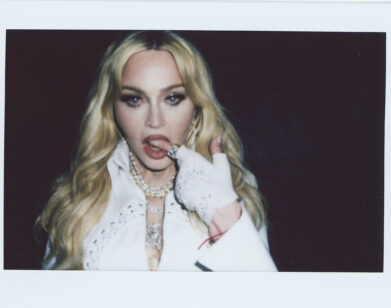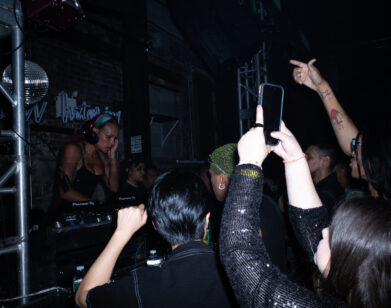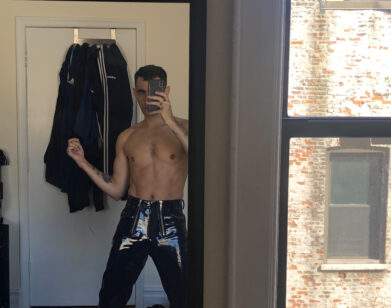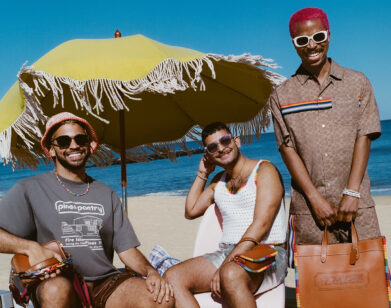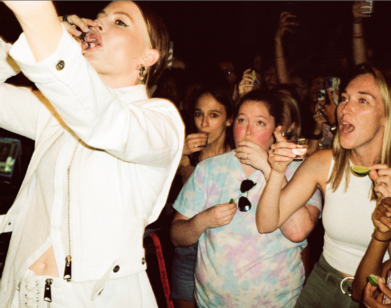ROUNDTABLE
The “Queer As Folk” Cast on Mediocre Straights and Evil Queers
In the era of the reboot, queer retellings (think The L Word: Generation Q) often err on the side of serving watered-down, buzz word-heavy social justice. Despite the relentless commercialization of queerness, LGBTQIA+ representation on screen has been remarkably narrow, overwhelmingly focused on the lives of affluent, white, cis, and able-bodied people. So when Peacock announced the remake of the seminal show Queer as Folk would be dropping just in time for Pride, expectations were mixed.
But for Stephen Dunn, the plan to reimagine QaF began years before the reboot craze—the Newfoundland-born director remembers falling in love with the 1999 original while watching it in his basement as a 10-year-old. After securing the blessing of Russell T Davies, the creator of the original drama series, Dunn moved the setting to New Orleans and assembled a cast of hot queers to bring the show to life. He also set up what Ryan O’Connell, a writer and actor on the show, described as the “Out100 of fucking writers’ rooms,” which included the likes of Brontez Purnell, Punkie Johnson, and Roxane Gay. Together, they wove a textured and nuanced set of queer narratives that offer a refreshing alternative to tired stories of trauma and cooptation. To mark the series’ release, we spoke with Dunn, O’Connell, and the actors Jesse James Keitel and Devin Way about insatiable gays, sleeping with the wrong people, and embodying the confidence of a mediocre straight white male. – ELLA MARTIN-GACHOT
———
ERNESTO MACIAS: Where is everyone calling from?
DUNN: I just got to San Francisco. Yesterday, I had to hold a “NO GAS” sign on the side of the road with my partner on the way here for the screening on Friday at Frameline. A firefighter literally brought us a jug of gas. I wanted to drive because it’s a beautiful road, but I need a bigger gas tank in my car.
RYAN O’CONNELL: And the firefighter rescuing you. That’s hot.
DUNN: It actually was kind of hot.
MACÍAS: And where is everyone else?
DEVIN WAY: I’m in Burbank.
O’CONNELL: [Laughs] He says with resignation.
JESSE JAMES KEITEL: I’m in the Hudson Valley. I’m far away from these hoes, on purpose.
O’CONNELL: I’m in Echo Park, my Covid palace, where I live, laugh, and love.
MACÍAS: What does Pride mean to you?
DUNN: You know, it’s a great time of year for all of us to come together and share queer spaces.
O’CONNELL: Oh, wow, what does Pride month mean to me? I’ve never been asked this question before. Let me think. Pride month to me just means taking up as much goddamn space as humanly possible, walking around with the confidence of a mediocre straight white male, which is what I try to do every goddamn day. When in doubt, just think about David Spade. Think about Rob Schneider. Think about Adam Sandler. They’re doing great. If I can embody an ounce of their confidence, I will be just fine. And that is Pride to me, sponsored by Target in collaboration with Home Goods.
KEITEL: I used to be like, “Where do I fit into the community?” And now it’s time to reflect on like, “What are we doing? What do we need as a people?”
WAY: Pride just feels like a family reunion. You get the corny shirts with your faces on them that say, “Blah, blah, blah reunion.”
KEITEL: We are clearly feeling a little silly today.
MACÍAS: Now that the show is out, how are you all handling the attention?
WAY: As Johnny [Sibilly] would say, “We got our elbows ready.” We were just like, [gestures with elbows] knocking the boys off.
DUNN: I’m a little exhausted seeing that people have already binged the entire season and are asking for more, cause we just finished it like two weeks ago. I’m like, “Honey, I need a vacation.”
KEITEL: The gays are insatiable.
MACÍAS: The first episode has caused a lot of controversy, and Twitter is lit. How do you depict such a traumatic event without it feeling like trauma porn?
DUNN: So our show is obviously a fictional tragedy that takes place in New Orleans. One thing that was important was not to show any acts of violence and to root the story in the community rebuilding, and our strength as we fight to find joy during trying times. Unfortunately that is a battle that continues culturally for us right now. We are empowered in new ways, but we are also met with so many new challenges and attacks on our basic human rights.
O’CONNELL: It’s easy for survivors to become a statistic, and for us to be like, “Well, this could never happen to us.” The opportunity to humanize these people and follow them in the aftermath and watch them rebuild their lives—I have never seen that. The media doesn’t really follow after the tragedy. They move on to the next, because unfortunately there are so fucking many.
MACÍAS: Ryan and Devin, Kim Cattrall plays your mom. How was it working with this veteran diva?
WAY: It was just refreshing. I was in the hair trailer with Kim once, and I asked her, “After so many roles, how do you keep having fun? Why do you keep saying yes to work, outside of money?” And she was like, “It’s just play.” She really just invited me to play with her.
O’CONNELL: Like any self-respecting homosexual, I’m a diehard Sex and the City fan. Samantha Jones was responsible for at least 12% of my personality. So to have Kim Cattrall play my mother, by golly, it just made sense. It was like a gay fever dream come to life, and working with her was such a delight. She’s so dry, she’s so perceptive. She recently told me, “I don’t wanna be anywhere where I don’t enjoy myself for longer than an hour.” I mean, chef’s kiss. And I feel like in person she’s exactly that way. She’s iconic, and she always will be. And by extension, me and Devin are iconic. That’s how genes work on TV.
MACÍAS: [Laughs] For Devin, your character is quite devilish on the show. How has your family reacted to it?
WAY: My biological mom called me two days ago because she watched it with my six-year-old niece. It really starts with a bang, you know? Well, she didn’t know that. She called me, and she was like, “Devin! I thought I was gonna get to know him first.” Right when that scene comes on, my niece was like, “There’s Uncle Devin!” And my mom had to jump in front of the TV, like, “It’s not him, look away!” My grandma said, “Well, I hadn’t seen you naked since you were little.” Things look a lot different now.
MACÍAS: Jesse, some of your character’s experiences come straight from Jaclyn Moore’s [executive producer and writer] life. Did you work closely with Jaclyn to build a character, or did you have free reign?
KEITEL: There was no learning curve with this writer’s room, and having someone like Jaclyn there to be like, “This is my lived experience as a trans woman” meant I didn’t have to speak up and say, “This isn’t true. This is transphobic. This is transmisogynistic.” So, the answer is no, I did nothing. I got to show up and be an actor and do my job. It was really refreshing.
MACÍAS: Ruthie is an iconic party girl or an “aspiring adult” as you described her. What have you learned from playing Ruth so far?
KEITEL: I’ve learned most from her confidence. She’s got this really strong sense of self, even when everything is a shit show.
MACÍAS: The characters are all horny. Why was it important, Ryan, to show characters, as you say, “living with disability and horny as hell?”
O’CONNELL: That’s called intersectionality, hello! No, I mean, here’s the deal. I’ve said this before, but I feel like as a queer disabled person, society just chopped my dick off right out of the gate. My whole life has just been me searching for my dick. So what’s great about this show is the freedom of having two disabled characters, Julian and Marvin who are very different in personality, but have commonalities in terms of their struggle with intimacy and letting their guard down through sex. It’s really important to highlight the warts and all of being a disabled person and, you know, put them in the driver’s seat. I think we did that.
MACÍAS: Stephen, the show is set in New Orleans, which you’ve described as a very queer city that hasn’t gotten the spotlight. How was the local queer community involved in the series?
DUNN: We tried as hard as we could to connect to the queer scenes and give any speaking roles that were available to members from the queer community. We also got to highlight the drag community in New Orleans a lot. New Orleans has such a distinctly punk, vibrant drag scene. We were even able to bring some performers to New York for some of our press. We did a promotional event this past weekend where Laveau Contraire, Debbie with a D, Siren, and Armand Fields all performed onstage outside of Stonewall Inn. We also got to highlight Choke Hole this amazing drag wrestling event that’s very specific to New Orleans that Hugo Gyrl, Visqueen, and Jassy all founded. We’re so grateful that they welcomed us to their home.
MACÍAS: You’ve all mentioned that the purpose of this show is to expand the queer narrative by showing messier characters and relationships. There’s a Carmen Maria Machado quote that says, “Some of us are unkind and some of us are confused and some of us sleep with the wrong people…it is, in fact, freeing: the idea that queer does not equal good or pure or right.” Do you think that Queer as Folk is successful in showing this?
JAMES KEITEL: I mean unkind, uncool and sleep with the wrong people… You’re looking at the three of us right here right now.
O’CONNELL: I sleep with the right people, okay!
DUNN: We’re not used to seeing queer characters as flawed and lovable. Queer characters historically have been villains in the past. We’ve become these saintly, perfect versions of ourselves in order to try and correct Hollywood’s past representation. We allow our Don Drapers, our Tony Sopranos, our Heisenbergs to be flawed, messy, selfish characters, but it is hard to get the opportunity to tell stories around queer people, making those same kinds of decisions.
KEITEL: Make the queers evil again.
O’CONNELL: Tony Soprano would literally murder people in cold blood every episode, and we’re like, “We love him. Also he’s kind of hot. He’s just having a bad day, he needts to go to Dr. Melfi and sort his shit out.” It’s like, okay [rolls eyes].
MACÍAS: Is there a message that you have for queer youth outside of hubs like New York, L.A., or San Francisco?
DUNN: The message is that there is a huge community out there waiting for you. Your current environment may not be a reflection of who you are or who you want to be at this moment, but there are people out there who can bring you closer to who you are.
WAY: Yeah, if I had to say something to young me growing up in middle America, I would say, “There’s no rush, we’re here. And when you feel safe, you have a place.”
KEITEL: There’s also an inherent shame that so many people are made to feel about their queerness. I hope someone could watch this show and see the moments of joy that we do share. Even though we have plenty of complicated, disastrous relationships, there are beautiful, fruitful, loving relationships that can be had too. You’re deserving of love.
MACÍAS: So season two, when?
DUNN: Good question, direct that message to Peacock. [Laughs]

